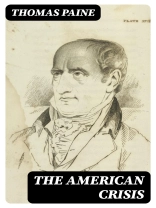In ‘The American Crisis, ‘ Thomas Paine delivers a compelling series of pamphlets that galvanize American colonists during their struggle for independence. Written in a direct and accessible style, Paine’s work employs powerful emotional appeals and reasoned arguments to articulate the urgency of revolution against British tyranny. This influential text, initially published between 1776 and 1783, serves as a rallying cry that emphasizes the necessity of fighting for liberty, employing rhetorical techniques such as analogies and vivid imagery to inspire a sense of unity and purpose among his readers. Thomas Paine, a self-taught philosopher and revolutionary thinker, was deeply influenced by Enlightenment ideals and his experiences as an immigrant in America. His conviction in the principles of democracy, individual rights, and the social contract underpinned his motivations for writing ‘The American Crisis.’ Paine’s background in politics and pamphleteering positioned him as a key figure in shaping public opinion during a pivotal moment in history, and his relentless spirit for justice inspired countless others to join the cause. ‘The American Crisis’ is an essential read for anyone interested in the foundations of American democracy and the power of persuasive writing. Paine’s passionate prose not only encapsulates the spirit of a nation in revolt but also serves as a timeless reminder of the struggles for freedom and the resilience required to achieve it. This work remains a crucial addition to the repertoire of both history enthusiasts and literary scholars alike.
عن المؤلف
Thomas Paine (1737-1809), an English-born American political activist, philosopher, political theorist, and revolutionary, is best known for his influential pamphlets at the start of the American Revolution, particularly ‘Common Sense’ (1776) and the series entitled ‘The American Crisis’ (1776-1783). These works not only galvanized the American public to support the fight for independence from British rule but also articulated the principles of democracy and republicanism that would shape the emerging nation. Paine’s ‘The American Crisis’ papers were penned during some of the most despondent times for the Continental Army but served to ignite the determination and morale needed to continue the struggle. His eloquent and fiery language combined with his capacity to distill complex political and philosophical issues into plain arguments accessible to a broad audience showcases his unique literary style. Alongside these, Paine’s other major work, ‘The Rights of Man’ (1791–1792), defended the French Revolution and articulated a vision of human rights that influenced both the French and English political landscapes. His later work, ‘The Age of Reason’ (1794, 1795, 1807), which advocated for deism and critiqued institutionalized religion and the practices of the church, underscored his role as a radical Enlightenment thinker. Paine’s work and thoughts continue to be studied for their contribution to political theory and their impact on the foundational ideals of the United States and modern democratic governance.












